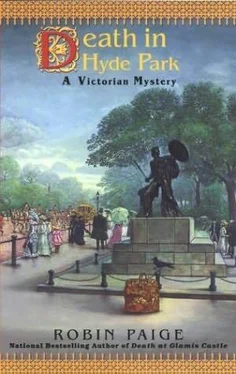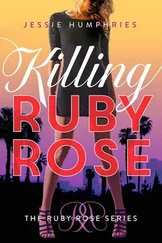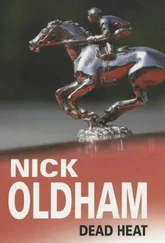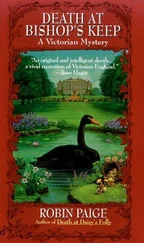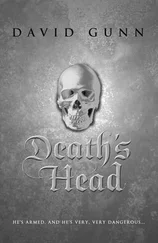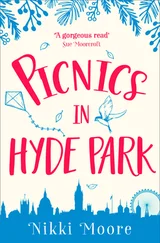Robin Paige - Death in Hyde Park
Здесь есть возможность читать онлайн «Robin Paige - Death in Hyde Park» весь текст электронной книги совершенно бесплатно (целиком полную версию без сокращений). В некоторых случаях можно слушать аудио, скачать через торрент в формате fb2 и присутствует краткое содержание. Жанр: Классический детектив, на английском языке. Описание произведения, (предисловие) а так же отзывы посетителей доступны на портале библиотеки ЛибКат.
- Название:Death in Hyde Park
- Автор:
- Жанр:
- Год:неизвестен
- ISBN:нет данных
- Рейтинг книги:5 / 5. Голосов: 1
-
Избранное:Добавить в избранное
- Отзывы:
-
Ваша оценка:
- 100
- 1
- 2
- 3
- 4
- 5
Death in Hyde Park: краткое содержание, описание и аннотация
Предлагаем к чтению аннотацию, описание, краткое содержание или предисловие (зависит от того, что написал сам автор книги «Death in Hyde Park»). Если вы не нашли необходимую информацию о книге — напишите в комментариях, мы постараемся отыскать её.
Death in Hyde Park — читать онлайн бесплатно полную книгу (весь текст) целиком
Ниже представлен текст книги, разбитый по страницам. Система сохранения места последней прочитанной страницы, позволяет с удобством читать онлайн бесплатно книгу «Death in Hyde Park», без необходимости каждый раз заново искать на чём Вы остановились. Поставьте закладку, и сможете в любой момент перейти на страницу, на которой закончили чтение.
Интервал:
Закладка:
Charles took off his cap and held it respectfully against his chest. “I’m looking for Yuri Messenko,” he said. “Is he here, please?”
The librarian’s eyes widened. “You haven’t heard? Or read in the newspapers?”
“Heard what?” Charles asked innocently. “I’ve been traveling on the Continent for the last several weeks.”
“Messenko was… killed.” With an uneasy glance, the librarian took in Charles’s worn overcoat and baggy trousers, seeming to be reassured by the unassuming costume. “It was an accident, or so I was told.”
“I’m very sorry to hear that,” Charles said. “It must have been a terrible shock to his friends. He came here frequently, I understand.”
“Occasionally,” the librarian replied, his tone becoming guarded, his eyes more anxious. “Why do you ask?”
“I need to contact someone, and I was told that Yuri Messenko could tell me how.” Charles gave a discouraged sigh. “Now I suppose I’ll have to find a different way.”
The libarian moved some papers on his desk. “Who did you want to contact?”
“His name is Vladimir Rasnokov,” Charles replied. He bent forward, adding eagerly, and in a louder voice, “Do you know Rasnokov? I should very much like to reach him.”
The librarian’s mouth tightened at the corners. “Rasnokov is not here.”
Charles let out his breath. “Do you know where I might find him?”
A bearded man wearing a dirty gray jerkin and a black knitted cap rose from his seat at the nearby table, returned his newspaper to a rack beside the window, and brushed past Charles on his way out the door. Another man, on the opposite side of the table, looked up and caught the librarian’s eye with a warning glance and an almost imperceptible shake of the head.
The librarian turned back to Charles. “Regrettably,” he said, in a formal tone, “I cannot help you. Rasnokov is not here. I do not know where he is to be found.”
Charles bowed his head. “Thank you,” he said humbly. He put on his cap and went out the door and down the steps. He was not surprised to see the man in the black knitted cap and gray jerkin waiting on the pavement in front of the cigar shop.
The man approached Charles. “Ye’re lookin’ fer Rasnokov, eh?” His voice was low and gravelly and his breath smelled of onions and garlic.
“I am,” Charles said. He straightened his shoulders.
“Wot’s yer business with ’im?”
Charles, no longer humble, gave the man a long, hard look. “That is between Rasnokov and myself. Do you know where to find him?”
“Wot’s in it fer me?”
Charles felt in his pocket and took out a shilling. “I have nothing else.”
The man took the coin with a hard look. “Ye might try the Little Moscow Cafe, in the cellar next t’ the Post Office. ’E has ’is lunch there most ev’ry day.”
“Thank you,” Charles said, and turned away. A few paces on, he paused and stood before the window of a tailor’s shop, his hands in the pockets of his coat. In the reflecting glass, he caught a glimpse of the man in the gray jerkin. He had mounted a rusty bicycle and was pedaling swiftly down Church Lane-on his way, no doubt, to the Little Moscow Cafe.
CHAPTER EIGHTEEN
Unfortunately, the Rossettis [Helen and Olivia] could not sustain such a narrative of female emancipation. In the conclusion to their novel, Isabel retracts her belief in anarchism and instead forcefully reinscribes the traditional feminine myth of hearth and home.
Jennifer Shaddock, Introduction to the Bison Book Edition, 1992, of Isabel Meredith, A Girl Among the Anarchists, 1902Olivia Rossetti was now married and with her husband in Italy, but after a call to Mr. Perry at Duckworth, Kate had no difficulty finding Helen Rossetti, who was living with her father in a small, comfortable house with an ivy-draped porch in a street in Chelsea. Kate had no difficulty introducing herself, either, since she had finished reading the manuscript of A Girl Among the Anarchists the night before and could tell Miss Rossetti that she had heartily enjoyed the adventures of Isabel Meredith and was recommending the novel to her editors for publication.
“I admired it very much,” she added, with genuine enthusiasm, when they were seated in the parlor. “It showed me an aspect of an Englishwoman’s life that I would otherwise have found difficult to imagine.”
Helen Rossetti, a small, plump young woman with dark eyes and dark hair pulled snugly back into a bun, sat back in her chair and gave a little cry of delight. “My dear Lady Sheridan!” she exclaimed. “How kind of you to come and tell me!” She flashed a mischievous smile that showed the dimples in her round cheeks. “And you are truly Beryl Bardwell?”
“Really, truly,” Kate said with a smile, glancing around the parlor. Miss Rossetti’s young years may have been unconventional, but her radical past could not be seen in this thoroughly conventional Victorian parlor: the tables skirted to conceal their legs, the windows heavily draped and closed to keep out the air, the souvenir knickknacks displayed on the fireplace mantle. But one wall displayed a large print of Dante Gabriel Rossetti’s “Proserpine,” and on a table lay a leather-bound copy of Christina Rossetti’s book, New Poems, which had been published two years after the famous poet’s death. Helen’s uncle was perhaps the best known of the Pre-Raphaelite artists, while her aunt’s poetry was widely admired.
“You’ve read some of my work?” Kate added, seeing two of her novels on the bookshelf.
“With great pleasure,” Miss Rossetti replied. “In fact, Olivia-my sister-and I have often read your books aloud. Our Isabel is a little like your Fanny, don’t you think, in The Adventure at Devil’s Bridge? Fanny is such an unconventional woman! Olivia and I loved the scene in which she drives the motorcar in pursuit of the balloon.”
“Your Isabel has an even greater sense of independence than my Fanny, I should say,” Kate replied, wanting to lead the conversation away from herself. “I understand that her adventures as the publisher of the Tocsin were inspired by your own experience with the Torch.”
“You know about that, then,” Miss Rossetti said, half-ruefully. “I suppose the editor at Duckworth must have told you. Yes, Olivia and I printed the newspaper on an old hand-press, and it was distributed by the local Anarchist group. We were very young-I was only thirteen when we brought out the first issue, and Oliva was sixteen-but we were quite in earnest about it.”
“If you don’t mind my saying so,” Kate ventured, “it seems an odd occupation for two young girls.”
“It was indeed,” Miss Rossetti agreed cheerfully. “But it may be that Anarchism-as we understood it, at least-chiefly attracts the rebellious young, or those who never mature. Olive and I both came to believe that Anarchism, as a philosophy, does not allow for the ties of love and family, or permit the Anarchist to accept responsibility for anyone but himself. That is why Isabel gives it up, in the end. She is disillusioned with Anarchism’s self-centeredness.” She smiled reminiscently. “In some ways, I’m sorry the Torch is gone. It was a remarkable education for a young woman, to be accepted in such militant circles. And I had more freedoms then than I do now that I am older-freedom to go about the city alone, freedom to say and write exactly as I thought. I doubt that many girls are granted such opportunities.”
Kate was sure of that. The English girls she knew were kept at home, where the reading of newspapers and the discussion of political topics was thought to be unladylike. “You say that the newspaper is gone,” she said. “You discontinued publication?”
Читать дальшеИнтервал:
Закладка:
Похожие книги на «Death in Hyde Park»
Представляем Вашему вниманию похожие книги на «Death in Hyde Park» списком для выбора. Мы отобрали схожую по названию и смыслу литературу в надежде предоставить читателям больше вариантов отыскать новые, интересные, ещё непрочитанные произведения.
Обсуждение, отзывы о книге «Death in Hyde Park» и просто собственные мнения читателей. Оставьте ваши комментарии, напишите, что Вы думаете о произведении, его смысле или главных героях. Укажите что конкретно понравилось, а что нет, и почему Вы так считаете.
